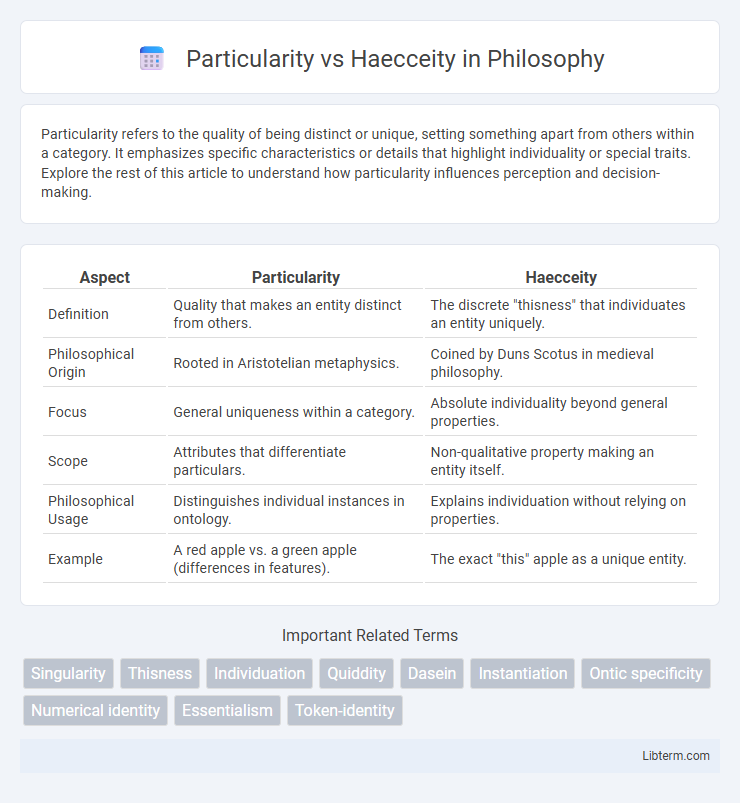Particularity refers to the quality of being distinct or unique, setting something apart from others within a category. It emphasizes specific characteristics or details that highlight individuality or special traits. Explore the rest of this article to understand how particularity influences perception and decision-making.
Table of Comparison
| Aspect | Particularity | Haecceity |
|---|---|---|
| Definition | Quality that makes an entity distinct from others. | The discrete "thisness" that individuates an entity uniquely. |
| Philosophical Origin | Rooted in Aristotelian metaphysics. | Coined by Duns Scotus in medieval philosophy. |
| Focus | General uniqueness within a category. | Absolute individuality beyond general properties. |
| Scope | Attributes that differentiate particulars. | Non-qualitative property making an entity itself. |
| Philosophical Usage | Distinguishes individual instances in ontology. | Explains individuation without relying on properties. |
| Example | A red apple vs. a green apple (differences in features). | The exact "this" apple as a unique entity. |
Understanding Particularity and Haecceity
Particularity refers to the quality or state of being distinct and separate, emphasizing the individual aspects that differentiate one entity from another within a category. Haecceity, a term coined by philosopher Duns Scotus, denotes the unique essence or "thisness" that makes an individual entity exactly what it is, beyond general characteristics or universal properties. Understanding particularity and haecceity involves recognizing how objects possess both identifiable traits and an intrinsic individuality that defines their singular existence in metaphysics.
Historical Roots of Both Concepts
Particularity and haecceity both emerge from medieval philosophical inquiry into individuality and essence, with particularity referring broadly to the distinct characteristics that define an individual entity. Haecceity, a term coined by the scholastic philosopher John Duns Scotus in the 14th century, emphasizes the "thisness" that makes an individual uniquely itself beyond general properties. The historical roots of both concepts trace back to Aristotelian metaphysics, where the problem of individuation initially arose, but haecceity specifically developed as a response to the limitations of traditional notions of universals and particulars.
Philosophical Definitions Explained
Particularity in philosophy refers to the unique attributes that distinguish an individual entity from others, emphasizing its specific qualities and spatial-temporal location. Haecceity, a term introduced by Duns Scotus, denotes the "thisness" or the intrinsic property that makes a thing exactly this particular entity and not another, serving as the essence of individuality. While particularity highlights the attributes and characteristics, haecceity focuses on the metaphysical principle underlying an object's individuality and identity.
Core Differences Between Particularity and Haecceity
Particularity refers to the distinctness of an object as an individual instance within a general category, emphasizing its unique properties or features. Haecceity, a term coined by philosopher Duns Scotus, denotes the "thisness" or the intrinsic individuality that makes an object uniquely itself beyond all qualitative properties. The core difference lies in particularity highlighting specific qualities that distinguish an entity, while haecceity captures the metaphysical individuality that cannot be reduced to any set of characteristics.
Medieval Perspectives: Duns Scotus and Beyond
Duns Scotus advanced the concept of haecceity as a non-qualitative property uniquely identifying an individual, distinguishing it from mere particularity, which refers to concrete instances of universal forms. His nuanced articulation emphasized haecceity as the 'thisness' of an entity, grounding individuality beyond shared essence in medieval ontology. Subsequent scholastics expanded on Scotus's framework, integrating haecceity into debates on substance, universals, and the nature of identity within the medieval tradition.
The Role of Haecceity in Metaphysics
Haecceity in metaphysics refers to the discrete qualities or properties that make an individual entity uniquely itself, distinguishing it from all others. Unlike a general particular, which can apply to multiple instances within a category, haecceity captures the unique, non-repeatable essence of an object's identity. This concept is crucial for discussions on individuation, identity persistence, and the ontology of uniqueness in metaphysical theory.
Particularity in Contemporary Philosophical Thought
Particularity in contemporary philosophical thought emphasizes the unique, individual characteristics that distinguish one entity from another within a broader category. It is often analyzed through the lens of metaphysics and ontology, highlighting how particulars resist reduction to general concepts or universal properties. This concept plays a crucial role in debates regarding identity, individuality, and the structure of reality, contrasting with Haecceity which denotes the discrete thisness that definitively individuates an entity.
Practical Examples Illustrating Both Concepts
Particularity refers to the unique features that distinguish an individual entity within a general category, such as a red apple among many apples. Haecceity denotes the specific "thisness" or essence that makes an entity uniquely itself, exemplified by the exact apple picked from a tree at a certain time and place. Practical examples include identifying a particular book by its edition and physical wear (particularity) versus recognizing its haecceity by its unique history and personal significance to an owner.
Critiques and Debates Surrounding Each Term
Particularity and haecceity have sparked significant debates in metaphysics regarding their roles in individuation and identity. Critics argue that particularity, often linked to qualitative properties, struggles to account for the exactness of individual entities without invoking haecceities, which emphasize a non-qualitative thisness. Haecceity faces challenges concerning its metaphysical status and explanatory power, with some philosophers questioning whether it introduces unnecessary metaphysical complexity beyond what particularity can sufficiently explain.
Implications for Identity and Individuality
Particularity refers to the distinct characteristics that differentiate an entity within a category, emphasizing unique traits that make an object identifiable. Haecceity, derived from medieval philosophy, denotes the immutable "thisness" or essence that singularly individuates an entity, beyond its properties. The implications for identity involve recognizing particularity as a basis for comparison, whereas haecceity asserts an intrinsic, non-qualitative individuality fundamental to understanding selfhood and persistence over time.
Particularity Infographic

 libterm.com
libterm.com